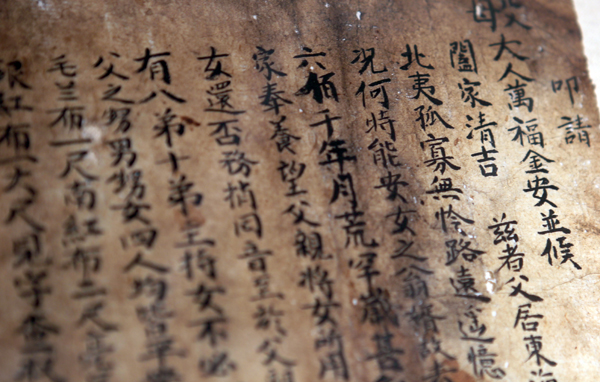Is the era of handwritten letters ending in China?
By Satarupa Bhattacharjya/Xing Yi ( China Daily ) Updated: 2015-05-09 09:17:16
 |
|
Handwritten letters. Photo provided to China Daily |
On the mail trail
Shiquan is located to the south of provincial capital Xi'an and is home to 180,000 people and 202 villages where crop farming, silk trade and tourism drive the local economy. The Han River runs through many of the villages, which are surrounded by the Qin Mountains and can be accessed by road and rail.
Zhao, the mail carrier, has been in media spotlight for winning government awards for her work in rural China. She and 14 other colleagues look after the distribution of mail in the county. China Post has a total of 105,000 delivery people, a good number working in the company's logistical support business.
Her first stop is at a site near the river, where a new railway line is being constructed. It is Da Gou village, where she delivers a few copies of the Shaanxi Daily, printed two days ago, for the men at work. A train passes though a tunnel overhead and yellow mustard flowers sway in the breeze as she then ascends a dusty road on her bike.
Newspapers are a big component of Zhao's weekly routine.
She can earn on top of her basic monthly salary of up to 2,800 yuan (around $450) by taking more and more of the subscribed papers to the villagers.
Next, on her way to the Shi Li Gou village, Zhao hands over a small parcel to a young man. He is thrilled to receive the box containing something that he had ordered online. Like many others in the countryside, he prefers to buy goods at virtual marketplaces, and can receive them by post.
Then, at the house of a village secretary of the Communist Party of China, Zhao delivers some newspapers for people to read during meetings.
Some among the village's older generations, like He Cui, 52, and Shi Ling, 61, describe handwritten letters as old-fashioned. The first woman says that she liked to receive letters years ago, when her children wrote to her from the cities they lived in, but she hasn't write one herself in this century. "The phone's there to talk," He says.
"Women in the village don't have the time to write letters," Shi says of their work at home and on the farms.
|
|
|
|
|
|
|
|

























 Raymond Zhou:
Raymond Zhou: Pauline D Loh:
Pauline D Loh: Hot Pot
Hot Pot Eco China
Eco China China Dream
China Dream China Face
China Face






